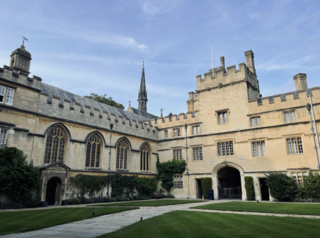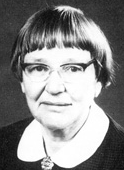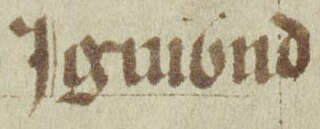
The Mabinogion are the earliest Welsh prose stories, and belong to the Matter of Britain. The stories were compiled in Middle Welsh in the 12th–13th centuries from earlier oral traditions. There are two main source manuscripts, created c. 1350–1410, as well as a few earlier fragments. The title covers a collection of eleven prose stories of widely different types, offering drama, philosophy, romance, tragedy, fantasy and humour, and created by various narrators over time. There is a classic hero quest, "Culhwch and Olwen"; a historic legend in "Lludd and Llefelys", complete with glimpses of a far off age; and other tales portray a very different King Arthur from the later popular versions. The highly sophisticated complexity of the Four Branches of the Mabinogi defies categorisation. The stories are so diverse that it has been argued that they are not even a true collection.

Jesus College is one of the constituent colleges of the University of Oxford in England. It is in the centre of the city, on a site between Turl Street, Ship Street, Cornmarket Street and Market Street. The college was founded by Queen Elizabeth I of England on 27 June 1571. A major driving force behind the establishment of the college was Hugh Price, a churchman from Brecon in Wales. The oldest buildings, in the first quadrangle, date from the 16th and early 17th centuries; a second quadrangle was added between about 1640 and about 1713, and a third quadrangle was built in about 1906. Further accommodation was built on the main site to mark the 400th anniversary of the college, in 1971, and student flats have been constructed at sites in north and east Oxford. A fourth quadrangle was completed in 2021.

Sir John Rhŷs, was a Welsh scholar, fellow of the British Academy, Celticist and the first professor of Celtic at Oxford University.
Prof Kenneth Hurlstone Jackson CBE FRSE FSA DLitt was an English linguist and a translator who specialised in the Celtic languages. He demonstrated how the text of the Ulster Cycle of tales, written circa AD 1100, preserves an oral tradition originating some six centuries earlier and reflects Celtic Irish society of the third and fourth century AD. His Celtic Miscellany is a popular standard.

Richard John Carwardine is a Welsh historian and academic. He specialises in American politics and religion in the era of the American Civil War.

Rachel Bromwich born Rachel Sheldon Amos, was a British scholar. Her focus was on medieval Welsh literature, and she taught Celtic Languages and Literature in the Department of Anglo-Saxon, Norse and Celtic at the University of Cambridge, from 1945 to 1976. Among her most important contributions to the study of Welsh literature is Trioedd Ynys Prydein, her edition of the Welsh Triads.
The Jesus Chair of Celtic is a professorship in Celtic studies at the University of Oxford within the Faculty of Medieval and Modern Languages. The holder is also a Professorial Fellow of Jesus College, Oxford. Just six people have held the chair since it was established in 1876, the first of whom was Sir John Rhys. The previous post-holder, Thomas Charles-Edwards, retired in 2011. An appeal to ensure the continuation of the chair successfully raised £3.25 million by the end of 2018, and in 2020 the post was taken up by its current incumbent David Willis.
Sir Keith Vivian Thomas is a Welsh historian of the early modern world based at Oxford University. He is best known as the author of Religion and the Decline of Magic and Man and the Natural World. From 1986 to 2000, he was president of Corpus Christi College, Oxford.
Colin H. Williams FLSW is a senior research associate at the VHI, l St Edmund's College, the University of Cambridge, UK. He was formerly a research professor in sociolinguistics, and later an honorary professor in the School of Welsh at Cardiff University.

The Cambrian Archaeological Association was founded in 1846 to examine, preserve and illustrate the ancient monuments and remains of the history, language, manners, customs, arts and industries of Wales and the Welsh Marches and to educate the public in such matters. The association's activities include sponsoring lectures, field visits, and study tours; as well as publishing its journal, Archaeologia Cambrensis, and monographs. It also provides grants to support research and publications.
Richard Sharpe,, Hon. was a British historian and academic, who was Professor of Diplomatic at the University of Oxford and a fellow of Wadham College, Oxford. His broad interests were the history of medieval England, Ireland, Scotland and Wales. He had a special concern with first-hand work on the primary sources of medieval history, including the practices of palaeography, diplomatic and the editorial process, as well as the historical and legal contexts of medieval documents. He was the general editor of the Corpus of British Medieval Library Catalogues, and editor of a forthcoming edition of the charters of King Henry I of England.
Ralph Arthur Griffiths OBE DLitt FRHistS FLSW is a historian and an emeritus professor at Swansea University.

Ingimundr, also known as Hingamund, Igmunt, Ingimund, was a tenth century Viking warlord. In 902, Irish sources record that the Vikings were driven from Dublin. It is almost certainly in the context of this exodus that Ingimundr appears on record. He is recorded to have led the abortive settlement of Norsemen on Anglesey, before being driven out from there as well. He appears to have then led his folk to the Wirral peninsula, where the English allowed him to settle his followers. Ingimundr's invasion of Anglesey may be the most notable Viking attack in Welsh history.
Daniel Huws FLSW is the world's leading authority of the last hundred years on Welsh manuscripts, with contributions that are held to represent a significant advance on those of John Gwenogvryn Evans.
Nancy Margaret Edwards, is a British archaeologist and academic, who specialises in medieval archaeology and ecclesiastical history. From 2008 to 2020, she was Professor of Medieval Archaeology at Bangor University; having retired, she is now emeritus professor.

Cyfoesi Myrddin a Gwenddydd ei Chwaer is an anonymous Middle Welsh poem of uncertain date consisting of 136 stanzas, mostly in englyn form. Myrddin, the legendary 6th-century North British bard and warrior, is depicted as being encouraged by his sister Gwenddydd to utter a series of prophecies detailing the future history of the kings of Gwynedd, leading up to an apocalyptic ending. The mood of the poem has been described as "one of despair and of loss of faith and trust in this world".

Ymadawiad Arthur is a Welsh-language poem, some 350 lines in length, by T. Gwynn Jones. It won its author the Chair at the National Eisteddfod in 1902 but was several times heavily revised by him in later years. It portrays King Arthur's last hours with his companion Bedwyr at the battle of Camlann and his final departure for Afallon. Ymadawiad Arthur is a hugely influential work, widely held to have opened a new era for Welsh-language poetry, marking the beginning of the early 20th-century renaissance of Welsh literature.
"Gorhoffedd Hywel ab Owain Gwynedd", sometimes known in English as "Hywel's Boast", has historically been considered a poem by the mid-12th-century prince, warrior and poet Hywel ab Owain Gwynedd. However, some scholars now believe it to be two quite separate poems by Hywel which have become fused together in the process of manuscript transmission. It is his best-known work. In the first half the poet expresses his love of his native Gwynedd – its scenery, its men and women – and boasts of his own prowess in defending them; in the second he praises several Welsh ladies and tells us how many of them are sexual conquests of his. According to the writer Gwyn Williams, "The sharpness and clarity of the North Wales landscape has never been so well caught in words, nor have tenderness and humour been better mingled in the expression of love".
Helen Fulton is a professor of Medieval Literature at Bristol University.










